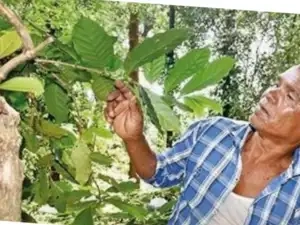 A farmer at his coffee plantation in Chumpi, Araku Valley (PHOTO CREDIT: SHANTANU NANDAN SHARMA)
A farmer at his coffee plantation in Chumpi, Araku Valley (PHOTO CREDIT: SHANTANU NANDAN SHARMA)
Unlike in Araku where a single GPS coordinate per plot suffices for EUDR compliance due to the small landholdings, all invariably under four acres larger estates in Karnatakas Kodagu (Coorg) and Chikkamagaluru require detailed polygon mapping.
We have already completed polygon mapping for our member estates in Coorg and have shipped two consignments of coffee that meet EUDR standards, says Vishwanath KK, CEO, Kodagu-based Biota Coorg Farmer Producer Company. He emphasises the urgency of scaling up geotagging efforts nationwide: Geolocation data must be collected in mission mode across India to ensure our coffee remains eligible for export under EU regulations from day one. Although the EUDR imposes penalties solely on European importers, Vishwanath notes, No importer will risk buying from an Indian exporter if the shipment whether coffee or the six other regulated commodities like cocoa, rubber fails to comply with the rules. For now, European buyers are accepting consignments if convinced the stock will be exhausted before the regulation comes into effect, he adds. But the pressure to demonstrate compliance that the product is not linked to deforestation will only grow stronger in the coming months. In Chumpi, a village nestled in the Araku Valley, coffee farmer Khogesh Rao says local buyers often come directly to their homes to purchase freshly harvested coffee fruits, which are then processed and passed on to larger buyers based in cities. Some of us have small pulping machines. If the coffee is washed, it fetches a better price, he explains, also adding that no one in his village has undertaken any geolocation exercise. Were working to reduce the role of middlemen by encouraging Araku farmers to engage directly with companies and even invest in small-scale curing units of their own, says Kalpana Kumari, managing director of Girijan Cooperative Corporation, a state-run body that procures coffee and minor forest produce from tribal farmers.Tata Coffee, Continental Coffee, Third Wave so many multinational enterprises are sourcing and exporting Araku coffee now, she adds.




